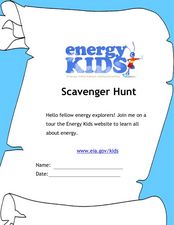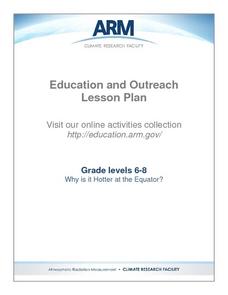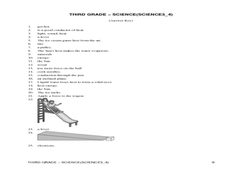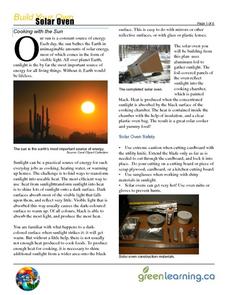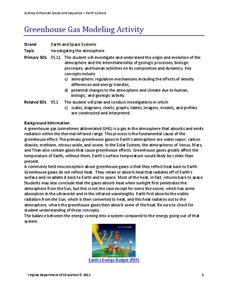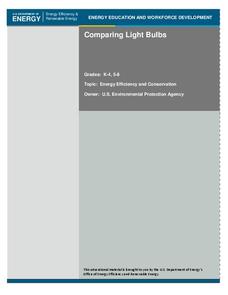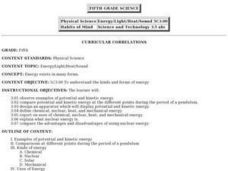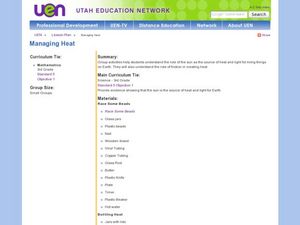Curated OER
Specific Heat
In this specific heat instructional activity, students are given examples to find the specific heats of substances and to use the specific heats to find the changes in temperatures of substances. Students solve eighteen problems using...
Curated OER
TE Lesson: Energy Transfer in Musical Instruments
Students study concepts of energy and energy transfer. They look at how these concepts apply to musical instruments. They study the law of conservation of energy. They use the concepts studied in the lesson to design a musical instrument.
Curated OER
Energy Efficient Buildings
Seventh graders create plans for an energy efficient addition to the school. They work in small groups with each group having responsibility for examining one aspect of the problem. They create working diagrams and a model of their...
Curated OER
Energy Adventure Scavenger Hunt
Students complete a scavenger hunt. In this energy lesson, students use various Internet websites to explore forms of energy, non-renewable sources, renewable sources, electricity, uses of energy and energy efficiency.
Curated OER
Energy in a Clean Environment
Students identify and describe the different types of energy and how it is transferred. In this energy lesson students complete several activities including how to calculate joules, adding up wattage, and create a presentation on...
Curated OER
Energy Conservation Games
Students become acquainted with the first law of thermodynamics, which concerns the conservation of energy as it is transformed from one form to another. They identify forms of energy, and devices or processes that transform energy from...
Curated OER
Why Is It Hotter At the Equator?
Middle schoolers investigate the different heating effects of sunlight. They conduct an experiment that demonstrates the way sunlight strikes the equator, the poles and other parts of the globe.
Curated OER
Third Grade Science Multiple Choice Practice
In this 3rd grade science worksheet, 3rd graders complete a total of 25 multiple choice questions related to grade 3 concepts. An answer key is given.
Curated OER
Solar Hot Box
Students investigate how different colors and materials create various temperatures and apply this it the concept of solar energy.
Curated OER
Cloudy vs. Clear
Students analyze line plots. In this weather lesson using real NASA data, students discuss how weather affects the way the Earth is heated by comparing different line plots.
Curated OER
Grass as Biomass
Students explore energy properties by listening to a sustainability lecture in class. In this biomass lesson, students identify what biomass is, how it can be transformed into a usable energy and how it complements the energy cycle....
Curated OER
Measuring the Number Of Calories In Sunlight
Learners., in groups, define calorie and compare the absorption of solar energy by three different collectors. They define solar constant and offer several explanations for discrepancies between the data collected and the solar constant.
US Department of Energy
Draft-O-Meter
Help your class improve the energy efficiency of their homes with the draft-o-meter. Simply tape a sheet of plastic wrap to a pencil and use it to observe any air leaking through windows, doorways, and other locations around the house....
Curated OER
Thermal Energy and Heat Unit
Students explain that heat energy in a material consists of the disordered motions of its atoms or molecules. They know and explain that transformations of energy usually transform some energy into the form of heat, which dissipates by...
Curated OER
Sunlight and Warm Air
Students discuss radiant energy from the sun, performing a simple experiment with sun glasses and bright light to demonstrate the concept. Students further participate in simple in-class experiments to demonstrate: air density as it...
Curated OER
Capturing Renewable Energy
Pupils watch a video segment on the engineering design process, then design a storage system for renewable energy. Students brainstorm and research ways in which renewable energies such as solar and wind power can be stored.
Curated OER
Capturing Renewable Energy
Students watch a video segment on the engineering design process, then design a storage system for renewable energy. Students brainstorm and research ways in which renewable energies such as solar and wind power can be stored.
Green Learning
Build Your Own Solar Oven
This is not exactly a lesson plan, but rather a six-page document detailing how to build a solar oven. A bit of background information, materials list, diagrams and photos, and clearly-written procedures are all included. There are no...
Virginia Department of Education
Greenhouse Gas Modeling Activity
Why are greenhouse gases called greenhouse gases? Young Earth scientists learn about greenhouse gases though experimentation in the second installment of a 3-part series. They use lamps to model radiant energy as well as warming through...
Virginia Department of Education
States of Matter
Scientists have been studying exothermic reactions before they were cool. The lesson begins with a discussion and a demonstration of heat curves. Scholars then determine the heat of fusion of ice and the heat needed to boil water through...
Curated OER
Comparing Light Bulbs
An average home produces twice as many emissions as an average car. Teach your class how to reduce energy consumption by replacing standard incandescent light bulbs with compact fluorescent light bulbs. Perform an experiment to compare...
CK-12 Foundation
Loop-the-Loop
What prevents a roller coaster from falling when it goes upside down? Scholars experiment with a roller coaster simulation controlling the mass of the coaster, the height of the hill, and the radius of the loop. They learn which factors...
Curated OER
Energy, Light, Heat, and Sound
Fifth graders investigate various forms of energy. They compare potential and kinetic energy at different points during the period of a pendulum, design an apparatus that displays potential and kinetic energy, and analyze the advantages...
Curated OER
Managing Heat
Third graders perform various experiments to show the flow of energy that causes heat. In this heat lesson, 3rd graders understand how heat is transferred or trapped. Students use the scientific method and critical thinking skills to...





